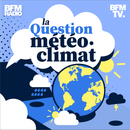Heatwave: a peak of nearly 600 emergency room visits recorded on July 1

When it's very hot, and for a long time, our bodies are put to the test. During the long heatwave that began on June 20 and ended on July 7, one in nine French people in mainland France was affected by an orange heatwave alert and nearly one in four by a red alert .
According to a report published Wednesday, July 9 by Public Health France , emergency consultations for heat-related disorders reached a peak in France on July 1, for all age groups.
These disorders concern heat stroke , hyperthermia, dehydration and hyponatremia, that is to say the reduction of the concentration of salt in the blood, which "can sometimes be the consequence of an excessive intake of water in relation to sodium (salt) or an excess loss of salt in relation to the elimination of water", explains the Ministry of Health .
This composite indicator, called "iHeatwave," groups together visits to emergency rooms and consultations with SOS Médecins for symptoms directly linked to the heat.
Tuesday, July 1st, was particularly hot across France, with sixteen departments placed on red heatwave alert. Nearly 600 people (569 visits) visited emergency rooms for heat-related illnesses, representing 1.3% of the total emergency room activity that day.
"Since then, the number of emergency room visits has been decreasing, returning to pre-episode numbers," says Public Health France.
Regarding SOS Médecins consultations, 284 consultations for iCanicule were observed on July 1st and 262 the following day. The number of consultations on July 1st "approached the maximum number of daily SOS consultations observed during the June 2019 heatwave," according to Public Health France.

An age group particularly at risk during heat waves, elderly patients were the most affected by emergency room visits during the recent heatwave: those over 75 years old accounted for more than half of the visits.
"The number of emergency room visits for people aged 75 and over peaked on July 2 (282 emergency room visits) and has been declining since then, but more slowly than for younger populations," explains Public Health France.
More than half of these emergency room visits were due to hyponatremia (57%) and a third were for dehydration (35%). Approximately three out of four emergency room visits by those over 75 resulted in hospitalization.
But younger people were not spared from the heat. "The number of emergency care visits for heatwaves among people under 15 and 15-44 years old increased until July 1st and then decreased," Public Health France reported Wednesday. These were mainly for hyperthermia and heatstroke.
"Emergency room visits for iCanicule resulted in hospitalization for 26% of people under 15 and 17% of those aged 15-44," we learned.
This initial assessment by Public Health France provides an idea of the extent of the health effects of a heatwave. "The initial health impacts observed highlight that heat is a health risk for all age groups, especially since the health effects can be delayed by a few days and increase with continuous exposure over several days," the organization writes.
Heat waves are particularly dangerous for the elderly, the sick, young children, outdoor workers, and anyone exposed to high temperatures for long periods without respite, especially during a series of hot nights.
Large areas of southern Europe have experienced a series of "tropical nights" , when temperatures do not drop enough to allow the body to recover.
A study by Imperial College London, conducted with the London School of Hygiene and Tropical Medicine and published on Wednesday, attempted for the first time to estimate the number of deaths attributable to this heatwave in 12 European cities and the proportion attributable to climate change.
The study estimates that the heatwave likely caused about 2,300 premature deaths between June 23 and July 2 in these cities. And about 1,500 deaths, or about two-thirds, would not have occurred without the degrees added by human climate disruption. Indeed, according to the study, climate change made the recent heatwave in western Europe up to 4°C warmer in many cities.
Authorities estimate it will take several weeks to establish a final death toll. A succession of similar incidents has already caused tens of thousands of premature deaths in Europe in previous summers.
The Weather-Climate Question, your BFMTV podcast
Why are we no longer used to the cold? How will climate change change our daily lives? Will we run out of water? What is an anticyclone? Every day, our journalists answer your questions about the weather and what the weather will be like. La Question météo-climat is a daily podcast from BFMTV, available on the website and the app and on all listening platforms - Apple Podcast , Amazon Music , Deezer or Spotify .
BFM TV





